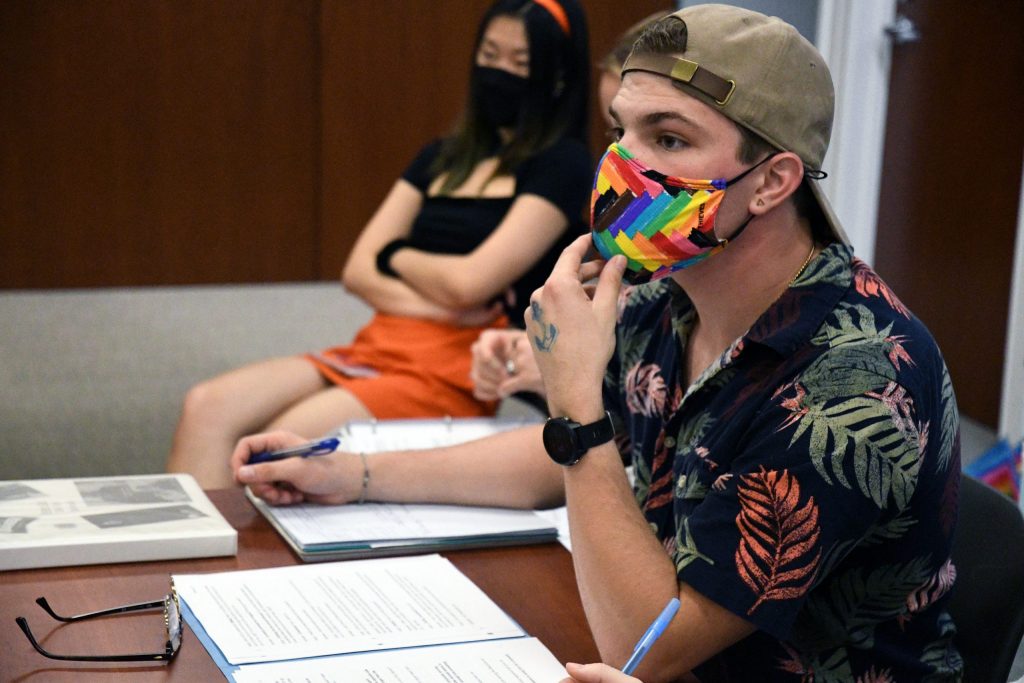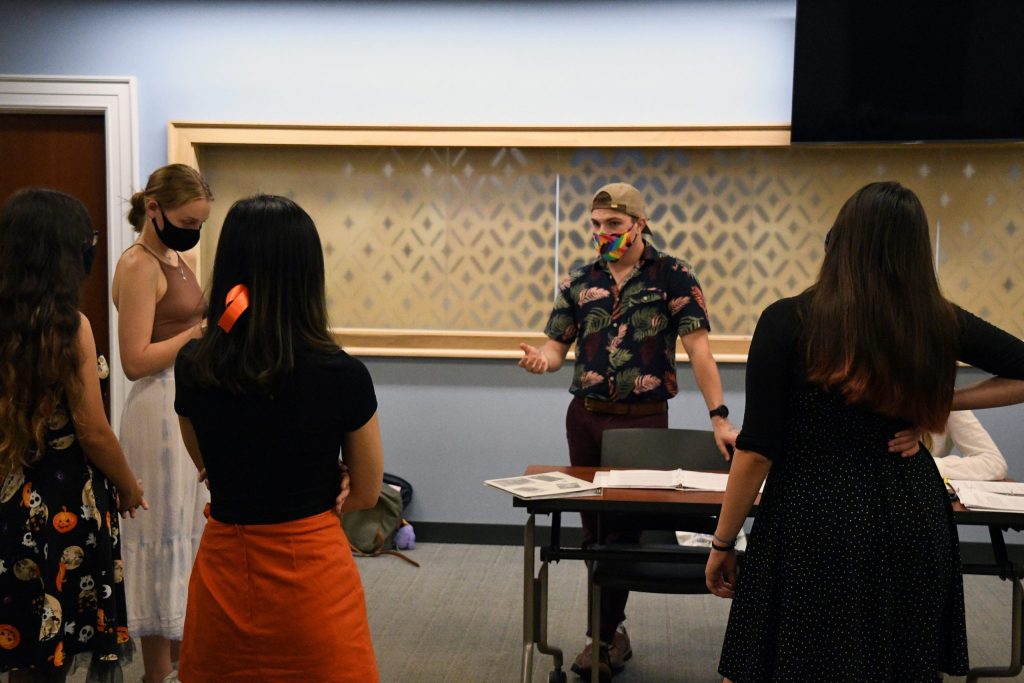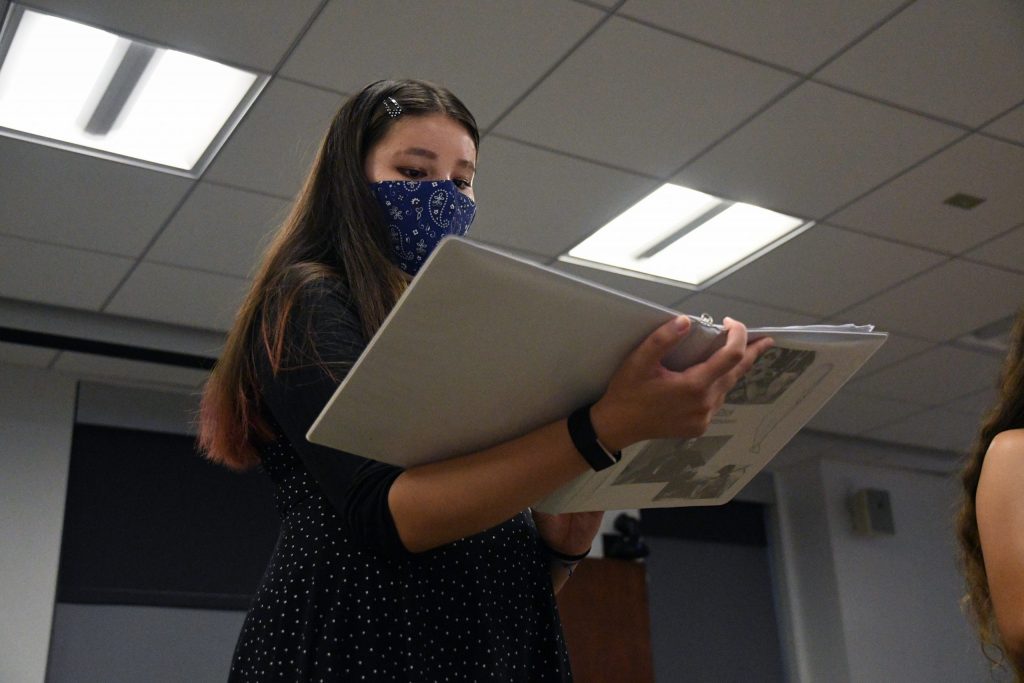Grad student brings queer insight to ‘Moby Dick’
Grad student brings queer insight to 'Moby Dick'

It all started with a dick joke.
For the past 18 months, Seth Knievel, a communications and rhetoric studies graduate student, has been adapting Herman Melville’s Moby Dick into a play titled Fatal Pride: A Queer Retelling of Moby Dick.
Knievel’s journey with the nautical novel began during his gap year. He sat in on a course his friend was teaching at his undergraduate alma mater, the University of North Texas. The students were tasked with adapting a well-known story for a modern audience. Knievel decided to search the top 100 American novels for inspiration. Moby Dick was on the list, which made Knievel laugh because, well, the word “dick” is funny.
But as Knievel dove deeper, he discovered a personal connection to Ahab’s navigation of trauma. In Knievel’s eyes, Ahab wasn’t seeking revenge but rather closure. Ahab was trying to process his grief, something Knievel understood personally. In the span of a week, Knievel had experienced a break-up, job loss and deaths of loved ones.
“I found myself in this situation where I am looking for closure, I needed something to get me over this grief in this trauma. I can’t find it, and I go a little crazy about it,” Knievel said, “And then I’m working on this project, and I see myself in Ahab.”
And underneath the 19th century language were connections to Knievel’s area of focus: queer controversy and everyday experiences. In Melville’s novel, Queequeg and Ishmael wed in what is one of the earliest depictions of same-sex marriage in Western literature. Some scholars, including Knievel, suggest Moby Dick is Melville’s love letter to Nathaniel Hawthorne to whom the book is dedicated (though, as Knievel pointed out with a laugh, Melville misspelled Hawthorne’s name).

Knievel’s Fatal Pride pulls heavily from the novel’s themes of trauma and queerness, weaving in pivotal, direct quotes from Moby Dick into a modern-day story of love, heartbreak and grief within the queer community. The Pequod is no longer a ship but a gay club where the familiar characters of Ishmael, Ahab, Queequeg, Starbuck and Moby, now human, collide. What starts out as a raunchy comedy quickly becomes something much darker.
“I want people to come in and think this is going to be a very flamboyant, very silly show, and then, very quickly, realize that we’re actually talking about things, like domestic abuse, substance abuse, intimate partner violence, obsession, closure, queer, grief,” Knievel said. “I think that this dichotomy that we have is reflective of the gay community in a very interesting way.”
Knieval is also directing the play, along with fellow CRS graduate and assistant director Maria Larcomb He invited his cast and creative team to collaborate on several Brechtian interludes. One devised interlude addresses Melville’s infamous, racist chapter “The Whiteness of the Whale.”
“I knew that they called Moby the ‘White Whale,’” said Valerie Goldstein, a policy studies freshman who is playing Ahab, “I thought, what if my character makes a joke like, ‘Why does the whale have to be white?’ and we talk about racism in the queer community because as a queer person of color, that’s something I’ve seen.”

The show also represents many firsts. For cast members Anna Bayly (Moby Dick), Ellany Tsin (Starbuck) and Gini Weisar (Ishmael), Fatal Pride is their first time performing.
“I saw a poster on the ESF campus actually, and I was like, ‘That looks fun.’ I’ve never been to an audition before, and I wasn’t going to audition. I was just going to watch other people audition,” Weisar said. The creative team asked her if she wanted to try out for the show, so Weisar decided to give it a shot and landed the role of Ishmael.
Fatal Pride will also be the first staged production presented by the CRS department — and also amidst a pandemic.
“COVID upended so many things–including this show, which was originally planned for the 2020-21 school year,” Kenievel’s adviser Lyndsay Gratch said in an email. “I think it was probably difficult at first for Seth to come to terms with the many contingencies this performance would likely need to contend with (because, really, who could have imagined this is what November 2021 would look like back in March 2020), but he’s clearly made his peace with this contingency–with expecting the unexpected and moving forward regardless, because of his dedication to the performance.”
The cast and creative team hope the show resonates with audiences. Knievel, in particular hopes, queer audiences see themselves in Fatal Pride.
“I feel like, oftentimes media is talking to straight people and queer people happen to been in the room,” Knievel said, “In this instance, it is queer people that I’m talking to, and straight people happen to be in the room.”
Tickets to Fatal Pride are free and can be reserved starting Nov. 1 by emailing csknieve@syr.edu. Performances will be held in the Hall of Languages 500 Nov. 11-13 at 7:30 pm each night.





